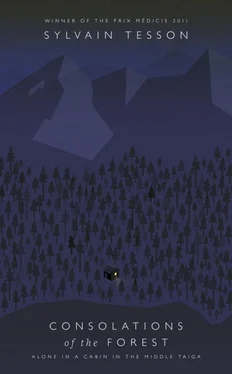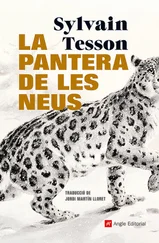I also cut down a dead birch; its bark will be useful tinder to get the stove going. The tree’s skin is striped with nicks: has a forest spirit been marking off the passing days?
By the time I turn homeward, large snowflakes blanket the bristling ranks of stumps and roots parading along the profile of the scree.
5 MARCH
Another incursion into the upper realm. I’m looking for the waterfall Sergei told me about: ‘An hour and a half on foot, elevation around 3,300 feet.’ I’m wandering in my snowshoes along the edge of the scree slope, above the cedar line. At the top of one of the canyons in the mountainside – elevation 3,000 – I chance upon the waterfall. The thin ribbon of ice falls from a notch in the summit of a schistose wall, hurling itself into the void and covering the black rock with mother-of-pearl.
Not a single bird calls. Winter has petrified life. The world waits to awaken. The snow, waterfall, clouds, even the silence: all held in suspense. One day, things will get going again. Warmth will come down from the sky and nature’s tissues will swell with the springtime flood. New blood will beat in the animals’ veins, the thalwegs will fill with water, sap will flow in the trees. Leaves will pierce the scales of their buds; the snows will murmur their desire to rush down to the lake; larvae will hatch and insects will emerge from the soil. A tremendous rushing sound will course down the mountainsides. Life will move along the slopes. Animals will head for the lake to drink as summer clouds make their way north. For the moment, though, I am the only creature floundering through the deep powder to get home.
In the evening, ice skating. An hour gliding along the lacquer. Visions slip past: plaques of obsidian, stripes as blue as a lagoon, like a perfume ad from the 80s.
Out on the ice, a tiny island of snow spared by the wind. I collapse there for a cigarillo. The cracking of Lake Baikal sends shudders through my bones. It’s good to live near a lake. A lake offers the spectacle of its symmetry (the shores and their reflections) and a lesson in equilibrium (the equation between its affluents and effluents). Miraculous precision is necessary to maintain its hydrographic levels, since each drop entering the basin must be redistributed.
Living in a cabin means having the time to take an interest in such things, the time to write them down, the time to read them over. And what’s more, once all that is done, you still have time left over.
At the window this evening, la mésange, mon ange : my angel the tit.
6 MARCH
I stay in bed this morning. Peeping out from under the comforter, I can see through the window the fat peach hoisting itself over the mountains of Buryatia. One day, the sun will reveal to us where it finds the strength to get up at dawn.
A gust of wind shoves an icy draught under the door. A hermit, isolated? But from what? Air slips through the beams, sunshine floods the table, water flows within a stone’s throw, humus lies beneath the wooden floor, snow filters in via the pores of the cabin, the scent of the forest percolates through gaps, an insect invites itself in to check out the parquet. In the city a layer of asphalt protects the foot from all contact with the earth, and people are hemmed in by walls of stone.
The lake is booming horrendously. Sitting with my tea, I open my volume of Schopenhauer’s The World as Will and Representation in the PUF edition with its orange cover. Back home in Paris, it sat in splendour on my table, where I never dared open it. There are books one circles warily. Basically, I’ve retired to the woods to finally do what has always intimidated me. In chapter 39 on ‘The Metaphysics of Music’ I read these lines:
The deepest notes correspond to the inferior degrees, the inorganic bodies that yet already possess certain properties; the upper register represents for us the plants and animals. […] All bodies and all organisms must be considered as emerging from the various degrees of evolution of the planetary mass that is both their support and their origin; this is exactly the same relationship that exists between the root of a chord and the upper register.
When the lake plays its composition of diffused crackings and detonations, this is what it is: the music of the inorganic and undifferentiated, a melody from the lower depths, the symphony of the world making its long-ago debut. A nameless something bubbles and gurgles, while over the basso continuo of its convulsions, a snowflake or a tit tries out a little tune.
The temperature drops precipitously. I chop down some wood in −31°F and when I get home, the heat seems like a supreme luxury. After the frigid air, the sound of a vodka cork popping near a cast-iron stove produces infinitely more pleasure than a palatial stay on the Grand Canal in Venice. That huts might rank with palaces is something the habitués of royal suites will never understand. They did not experience the aching of numbed fingers before they learned about bubble baths. Luxury is not a state but the crossing of a line, a threshold beyond which, suddenly, all suffering ceases.
It’s noon, quite windy, and I’m off. I’m setting out on foot for the island of Ujkani, eighty-one miles away. I’m allowing three days to reach Sergei’s ranger station, then a day to get to the island, a second to stay overnight, a third to get off the island – and three more days to get home. I’m pulling a child’s sledge loaded with a bag of clothing, some provisions, my skates, Rousseau’s Reveries , and Jünger’s journal, which I began reading yesterday. A humanist philosopher and a Swabian entomologist: serious company.
I traverse chaotic jumbles of ice. Snow has spread white cream over the blue slices; I’m walking on a cake for a boreal god. At times the sun illuminates the tips of icicles, lighting up stars in broad daylight. On the dark, glassy sections, the fault lines run through the obsidian masses in a recurrent pattern, a kind of arboreal schema in right angles, branching out in the manner of genealogical trees, or the roots of certain plants. Might that correspond to a mathematical structure, a writing determined by the laws of the universe? Water has a memory; perhaps ice possesses a form of intelligence (a cold one, of course)?
After six hours of walking, I round a cape and see the hamlet of Zavorotni, a few wooden houses nestled in a bay. Only one is occupied year-round, by a ranger named Volodya E. This place is an enclave about six miles by twelve within the reserve, a free zone where Russians can indulge in their favourite activity: doing whatever they want. The village served as a rear base for the teams of men who worked a microquartz mine in the local mountain at an elevation of 3,300 feet. Microquartz was used in the manufacture of diamond styluses for stereos and the needles in some oscillators. I owe my knowledge of these fascinating things to V.E., who welcomes me into his izba.
His kitchen is basically a pigsty. Grease coats the walls. The floor is dangerous: a person might slip on some fish guts and tip over one of the pots full of simmering seal grease intended for the dogs who run riot here. V.E. was for a long time the head of the weather station at Solnechnaya, twenty-five miles to the south. He’s a former alcoholic who stopped drinking after a heart attack; he is doing better these days, but his teeth are gone.
He shows me a chunk of lava, a present from some geologists.
‘These are the oldest minerals in the world,’ he tells me.
‘How old?’
‘Four billion years. I put it under my pillow to inspire my dreams.’
‘And?’
‘Nothing yet.’ He adds: ‘You hungry?’
‘Yes.’
‘You want some fish?’
Читать дальше












